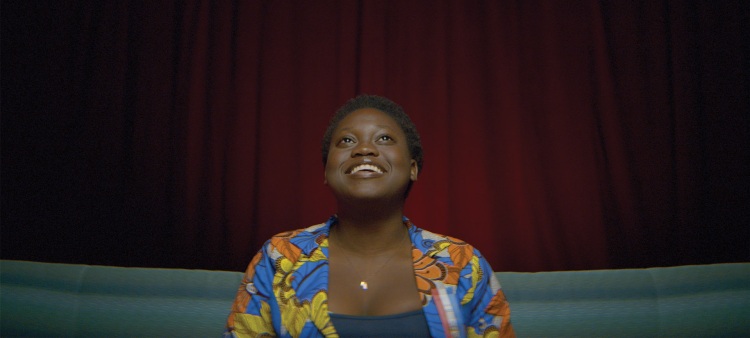Speak (Tiexiera and Mossman, 2025)
Speak is this year’s feel-good film at Full Frame, and it comes with all the feels one wants and needs from a festival crowd-pleaser.
I have mentioned elsewhere that film festivals, particularly those with a strong emphasis on political or social themes, can trigger compassion fatigue and even existential angst. A steady bombardment with the problems of those in war zones, those who are racially oppressed, gender oppressed, economically oppressed, or facing forces beyond their control (i.e. all of us) can leave viewers more despairing than energized, with their consciousness numbed rather than raised.
The problems of the modern world are present in Speak, but they are mediated through the consciousness of five young people, contestants in the Original Oratory category of the National Speech and Debate Association’s annual competition. The favorite is clearly two-time defending champion Esther Oyetunji, whose speech scolds politicians and leaders for using “the King’s Gambit,” leveraging our desire to protect children while failing to enact policies to restrict gun violence. Her stiffest competition appears to be Mfaz, a Wisconsin teen praising the virtues of Sesame Street. The film is rounded out with profiles of three other competitors offering insights about caring for a sibling with Down’s syndrome, being gay at a religiously conservative Bible-camp, and coping with a parent’s suicide.
It is hard not to compare Speak to Boys State and Girls State, a pair of lauded documentaries of young adults roughly the same age also competing in a prestigious and high-stakes event. A point of difference is that Speak focuses a bit more on the contestants rather than the event itself. By spending more time in the preliminary competitions and the biographies of the subjects, it does play a bit like a conventional narrative sports film. Nevertheless, I was glad to know how the speakers’ lives informed their oratory and not just that they reeeeeeeeeally wanted to win.
I would have liked to have seen a bit more of the oratories themselves rather than just snippets of them. That’s a defensible choice, I suppose in that things could have gotten very repetitive as we heard the same speeches over and over, but my sense from the film is that the oratories are not scripts and hence did develop and change. And I guess I would have welcomed a process documentary that tracked that development rather than just keeping score along the way.
This point is especially relevant in the case of Mfaz, who decides after a disappointing result in a preliminary event to pivot and include a take on Palestine in her speech. A coach informs us that this is risky because taboo topics can alienate the judges and are typically avoided. It’s frustrating to only catch broad suggestions about how this gets integrated into her speech about Sesame Street. Consequently, we can’t know what impact that gamble had on her score.
There is something meta about Mfaz’s decision because the documentary itself has to decide whether to focus on broader, more universal aspirations (self-acceptance, caring for others, kindness, hope) or more specific problems (political division, inequity, anti-gay legislation) that might be more polarizing than inspiring. The cynic in me wonders if Esther’s success lies in the blunt force of irrefutable truth or in her ability to allude to topics of social criticism without specifically targeting a person, party, or organization. Should the impact of an oratory be to propel actions or engender feelings? Speak did leave me wondering if the judges simply valued homilitcs over content or if it was a sign of the times that all of the oratory felt a little squeamish about the dangers of being labeled partisan.

